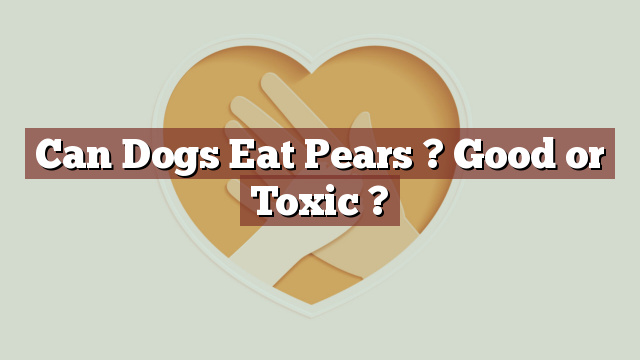Can Dogs Eat Pears? Good or Toxic?
As responsible pet owners, it is crucial to be well-informed about what foods are safe for our furry friends to consume. While it is tempting to share our snacks with our dogs, not all human foods are suitable for their digestive systems. Today, we will be exploring whether dogs can eat pears and whether they are a healthy option for our beloved pets.
Nutritional Value of Pears: A Healthy Option for Dogs
Pears are not only delicious but also packed with essential nutrients that can benefit our furry companions. These fruits are an excellent source of fiber, which aids in maintaining a healthy digestive system for dogs. The natural sugars found in pears provide a healthy energy boost, making them a great alternative to processed treats. Additionally, pears are rich in vitamins C and K, as well as copper, which play a vital role in supporting overall canine health.
Can Dogs Eat Pears? Exploring Safety and Toxicity
Yes, dogs can indeed eat pears! Pears are generally safe for dogs to consume, and in fact, many commercial dog foods include pear as an ingredient. However, it is important to note that moderation is key. While pears offer numerous health benefits, feeding them in excess may lead to an upset stomach or diarrhea due to their high fiber content.
It is also important to ensure that the pears fed to dogs are ripe and properly washed, with no seeds or stems. The seeds contain small amounts of cyanide, which can be toxic to dogs if consumed in large quantities. As a precaution, it is best to remove the seeds and core of the pear before sharing it with your furry friend.
Potential Risks or Benefits of Feeding Pears to Dogs
Feeding pears to dogs in moderation can be highly beneficial. The fiber content in pears promotes healthy digestion and can alleviate constipation in dogs. Pears also contain antioxidants that help boost the immune system and protect against cellular damage. Moreover, the natural sugars in pears make them a healthier alternative to sugary dog treats, helping to maintain a healthy weight for your canine companion.
However, it is essential to remember that every dog is different, and some dogs may have individual sensitivities or allergies. If you notice any adverse reactions, such as vomiting, diarrhea, or allergic symptoms like itching or swelling, it is advisable to discontinue feeding pears and consult a veterinarian.
My Dog Ate Pears, Now What? Steps to Take
If you discover that your furry friend has helped themselves to a pear or two, there is generally no cause for alarm. As long as your dog has consumed a moderate amount and has not shown any adverse reactions, there should be no immediate cause for concern. However, it is always a good idea to monitor your dog for any signs of digestive distress, such as vomiting or diarrhea.
If your dog has ingested a large amount of pear seeds or stems, it is best to contact your veterinarian immediately. The veterinarian will be able to assess the situation and provide appropriate guidance based on your dog’s specific condition.
Conclusion: Pears Can Be a Safe and Nutritious Treat for Dogs
In conclusion, pears can be a safe and nutritious addition to your dog’s diet when fed in moderation. The high fiber content and vitamins found in pears offer various health benefits, supporting a healthy digestive system and immune function. However, it is crucial to remove the seeds and core before feeding pears to your dog, as these parts can be toxic in large quantities.
As with any dietary change, it is recommended to introduce new foods gradually and monitor your dog for any adverse reactions. If you have any concerns or questions about your dog’s diet, it is always best to consult with a veterinarian who can provide personalized advice based on your dog’s unique needs.
Thank you for investing your time in exploring [page_title] on Can-Eat.org. Our goal is to provide readers like you with thorough and reliable information about various dietary topics. Each article, including [page_title], stems from diligent research and a passion for understanding the nuances of our food choices. We believe that knowledge is a vital step towards making informed and healthy decisions. However, while "[page_title]" sheds light on its specific topic, it's crucial to remember that everyone's body reacts differently to foods and dietary changes. What might be beneficial for one person could have different effects on another. Before you consider integrating suggestions or insights from "[page_title]" into your diet, it's always wise to consult with a nutritionist or healthcare professional. Their specialized knowledge ensures that you're making choices best suited to your individual health needs. As you navigate [page_title], be mindful of potential allergies, intolerances, or unique dietary requirements you may have. No singular article can capture the vast diversity of human health, and individualized guidance is invaluable. The content provided in [page_title] serves as a general guide. It is not, by any means, a substitute for personalized medical or nutritional advice. Your health should always be the top priority, and professional guidance is the best path forward. In your journey towards a balanced and nutritious lifestyle, we hope that [page_title] serves as a helpful stepping stone. Remember, informed decisions lead to healthier outcomes. Thank you for trusting Can-Eat.org. Continue exploring, learning, and prioritizing your health. Cheers to a well-informed and healthier future!

